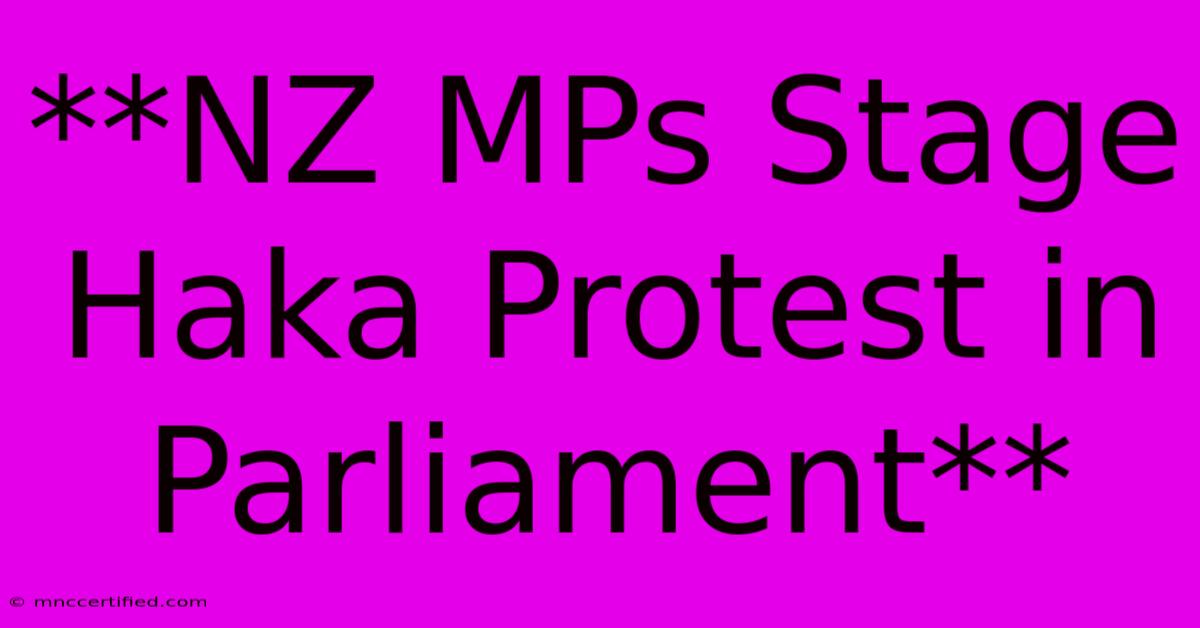**NZ MPs Stage Haka Protest In Parliament**

Table of Contents
NZ MPs Stage Haka Protest in Parliament: A Powerful Display of Cultural Identity and Political Action
The New Zealand Parliament recently witnessed a powerful display of cultural pride and political protest as a group of Māori Members of Parliament (MPs) performed a haka within the parliamentary precinct. This unprecedented event garnered significant national and international attention, sparking discussions about Indigenous rights, political representation, and the role of cultural expression in contemporary politics. This article delves into the details of this impactful protest, exploring its motivations, significance, and implications.
The Context: Why the Haka?
The haka, a traditional Māori war dance, is far more than a mere performance. It's a potent symbol of identity, strength, unity, and defiance. Its use in this context was not accidental; it was a deliberate and strategic choice to convey a powerful message. While the specific issues prompting the haka varied depending on the participating MPs, several key themes emerged:
Land Rights and Treaty of Waitangi Issues:
Many Māori MPs feel the government hasn't adequately addressed ongoing injustices stemming from the Treaty of Waitangi, New Zealand's founding document. Issues surrounding land rights, resource management, and the Crown's responsibilities to Māori continue to be contentious and fuel ongoing protest. The haka served as a visceral expression of frustration and a demand for meaningful action.
Marginalization and Underrepresentation:
The haka also highlighted feelings of marginalization and underrepresentation within the political system. Māori MPs may feel their voices are not being heard or that their concerns are being consistently ignored. The performance acted as a powerful visual representation of their collective voice and a demand for greater inclusion and respect.
Environmental Concerns:
The protest also touched upon environmental issues impacting Māori communities, including the loss of natural resources and the effects of climate change. The haka underscored the deep connection Māori have with their land and the urgency of addressing these environmental threats.
The Haka Itself: A Symbol of Resistance and Unity
The haka performed wasn't a spontaneous outburst; it was a carefully considered act of political theater. The choice of haka, the specific movements, and the overall execution were all significant. The power of the performance lay not just in the physicality of the dance but also in the collective emotion and shared purpose it conveyed. It was a powerful statement of cultural identity and a challenge to the status quo.
National and International Response:
The haka protest sparked intense debate and discussion, both domestically and internationally. While many lauded the MPs for their powerful and poignant display of cultural pride and political action, others criticized the event as disruptive or inappropriate within the parliamentary setting. This diverse range of reactions highlights the complex and multifaceted nature of the issues raised.
The Implications and Future Outlook
The haka protest in the New Zealand Parliament marks a significant moment in the ongoing struggle for Māori rights and recognition. It serves as a potent reminder of the enduring power of cultural expression as a tool for political activism and a call for greater inclusivity and responsiveness within the political system.
The event's long-term implications remain to be seen, but it undoubtedly raises important questions about the relationship between Indigenous populations and their governments, the role of cultural expression in political discourse, and the ongoing fight for social justice. The impact of this powerful visual statement is likely to resonate for years to come, shaping future conversations and actions regarding Māori rights and representation in New Zealand.
Keywords: NZ MPs, haka protest, Parliament, Māori, Indigenous rights, Treaty of Waitangi, political protest, cultural expression, New Zealand politics, land rights, environmental issues, political representation, social justice.

Thank you for visiting our website wich cover about **NZ MPs Stage Haka Protest In Parliament**. We hope the information provided has been useful to you. Feel free to contact us if you have any questions or need further assistance. See you next time and dont miss to bookmark.
Featured Posts
-
England Vs Greece Team News And Lineups
Nov 15, 2024
-
Pitbull Tickets Uk And Europe Tour On Sale
Nov 15, 2024
-
Usa Vs Jamaica Live Cade On November 14
Nov 15, 2024
-
Alex Hodge And Watkins Interview
Nov 15, 2024
-
Thursday Night Football Eagles Channel
Nov 15, 2024